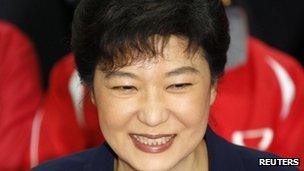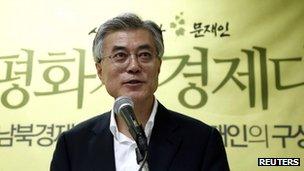South Korea's presidential candidates
- Published
Two main candidates are set to face off in South Korea's presidential elections - the ruling New Frontier (Saenuri) Party's Park Geun-hye and the opposition Democratic United Party's Moon Jae-in.
A third independent candidate, software mogul Ahn Cheol-soo, dropped out of the race to support Mr Moon.
The BBC profiles Ms Park and Mr Moon ahead of the 19 December ballot.
Park Geun-hye

Ms Park is the daughter of a former president
Park Geun-hye, 60, is the candidate of the ruling conservative party, Saenuri, or New Frontier Party.
Her nomination marks the first time that a woman has been chosen as a presidential candidate by a main political party in South Korea.
Ms Park is no stranger to politics. The daughter of former President Park Chung-hee, she served as South Korea's first lady for five years after her mother was shot dead in 1974.
Her father, who seized power in a military coup in 1961, ruled until he was assassinated by his spy chief in 1979.
While Mr Park was credited with boosting South Korea's economy, he was also accused of ruthlessly crushing dissent and delaying democratic development.
A number of analysts tip Ms Park as the election favourite, but she has been dogged by her family legacy. In September, she issued a public apology for human rights abuses committed under her father.
Ms Park was first elected to South Korea's National Assembly in 1998. She sought the presidency in 2007, but her party instead nominated Lee Myung-bak, the current South Korean leader.
She holds an engineering degree from Sogang University in Seoul and an honorary degree in literature from the Moonward University in Taiwan.
She is not married - something that has exposed her to comment in South Korea's conservative society - and is seen as a private individual.
As part of her presidential campaign, Ms Park has pledged to prioritise "national reconciliation", better "economic democracy" and social welfare.
Moon Jae-in

Mr Moon used to be an aide to former President Roh
Former human rights lawyer Moon Jae-in, 59, is the presidential candidate of the liberal opposition Democratic United Party.
The lawmaker from the city of Pusan, also known by the political nickname "Shadow of Roh", used to be former President Roh Moo-hyun's chief of staff.
Mr Roh, who finished his term in 2008 amid a sluggish economic climate, committed suicide in 2009 after his family was investigated over bribery allegations.
As part of his presidential bid, Mr Moon has said that he will engage with North Korea following years of tension under the current government. This stance follows the example set by Mr Roh, who held talks with his North Korean counterpart.
The two Koreas are still technically at war despite their truce in 1953.
In terms of the economy, Mr Moon says he wants to re-examine the country's Free Trade Agreement with the US, increase taxes on the wealthy and curb the power of big business.
Mr Moon published an autobiography said to have sold hundreds of thousands of copies. In it he tells of his experiences growing up in a poor family.
The son of North Korean refugees, Mr Moon's father worked at a prison camp and his mother was a peddler.
As a student activist, he had led protests during the term of presidential rival Park Geun-hye's father in the 1970s, for which he was imprisoned.
Mr Moon finished his law degree from Kyunghee University in Seoul. He has also trained under the military's special forces.
He is married with two children.